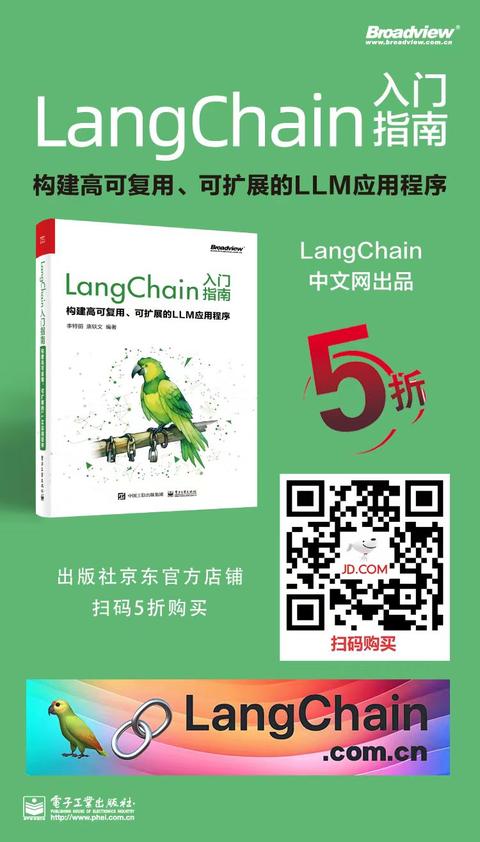如何将运行时值传递给工具
📦Compatibility
The code in this guide requires
langchain-core>=0.2.21. Please ensure you have the correct packages installed.您可能需要将仅在运行时已知的值绑定到工具。例如,工具逻辑可能需要使用发出请求的用户的ID。
大多数情况下,这些值不应由大型语言模型(LLM)控制。实际上,允许LLM控制用户ID可能会导致安全风险。
相反,LLM应仅控制工具中应由LLM控制的参数,而其他参数(如用户ID)应由应用程序逻辑固定。
本使用手册将向您展示如何防止模型生成某些工具参数并在运行时直接注入它们。
Using with LangGraph
如果您正在使用LangGraph,请参考本使用手册 该手册展示了如何创建一个代理,以跟踪特定用户的最爱宠物。
我们可以将它们绑定到聊天模型,如下所示:
- OpenAI
- Anthropic
- Azure
- Cohere
- NVIDIA
- FireworksAI
- Groq
- MistralAI
- TogetherAI
pip install -qU langchain-openai
import getpass
import os
os.environ["OPENAI_API_KEY"] = getpass.getpass()
from langchain_openai import ChatOpenAI
llm = ChatOpenAI(model="gpt-4o-mini")
pip install -qU langchain-anthropic
import getpass
import os
os.environ["ANTHROPIC_API_KEY"] = getpass.getpass()
from langchain_anthropic import ChatAnthropic
llm = ChatAnthropic(model="claude-3-5-sonnet-20240620")
pip install -qU langchain-openai
import getpass
import os
os.environ["AZURE_OPENAI_API_KEY"] = getpass.getpass()
from langchain_openai import AzureChatOpenAI
llm = AzureChatOpenAI(
azure_endpoint=os.environ["AZURE_OPENAI_ENDPOINT"],
azure_deployment=os.environ["AZURE_OPENAI_DEPLOYMENT_NAME"],
openai_api_version=os.environ["AZURE_OPENAI_API_VERSION"],
)
pip install -qU langchain-google-vertexai
import getpass
import os
os.environ["GOOGLE_API_KEY"] = getpass.getpass()
from langchain_google_vertexai import ChatVertexAI
llm = ChatVertexAI(model="gemini-1.5-flash")
pip install -qU langchain-cohere
import getpass
import os
os.environ["COHERE_API_KEY"] = getpass.getpass()
from langchain_cohere import ChatCohere
llm = ChatCohere(model="command-r-plus")
pip install -qU langchain-nvidia-ai-endpoints
import getpass
import os
os.environ["NVIDIA_API_KEY"] = getpass.getpass()
from langchain import ChatNVIDIA
llm = ChatNVIDIA(model="meta/llama3-70b-instruct")
pip install -qU langchain-fireworks
import getpass
import os
os.environ["FIREWORKS_API_KEY"] = getpass.getpass()
from langchain_fireworks import ChatFireworks
llm = ChatFireworks(model="accounts/fireworks/models/firefunction-v1", temperature=0)
pip install -qU langchain-groq
import getpass
import os
os.environ["GROQ_API_KEY"] = getpass.getpass()
from langchain_groq import ChatGroq
llm = ChatGroq(model="llama3-8b-8192")
pip install -qU langchain-mistralai
import getpass
import os
os.environ["MISTRAL_API_KEY"] = getpass.getpass()
from langchain_mistralai import ChatMistralAI
llm = ChatMistralAI(model="mistral-large-latest")
pip install -qU langchain-openai
import getpass
import os
os.environ["TOGETHER_API_KEY"] = getpass.getpass()
from langchain_openai import ChatOpenAI
llm = ChatOpenAI(
base_url="https://api.together.xyz/v1",
api_key=os.environ["TOGETHER_API_KEY"],
model="mistralai/Mixtral-8x7B-Instruct-v0.1",
)
隐藏模型参数
我们可以使用 InjectedToolArg 注解来标记我们工具的某些参数,例如 user_id,表示它们在运行时被注入,意味着它们不应该由模型生成
<!--IMPORTS:[{"imported": "InjectedToolArg", "source": "langchain_core.tools", "docs": "https://python.langchain.com/api_reference/core/tools/langchain_core.tools.base.InjectedToolArg.html", "title": "How to pass run time values to tools"}, {"imported": "tool", "source": "langchain_core.tools", "docs": "https://python.langchain.com/api_reference/core/tools/langchain_core.tools.convert.tool.html", "title": "How to pass run time values to tools"}]-->
from typing import List
from langchain_core.tools import InjectedToolArg, tool
from typing_extensions import Annotated
user_to_pets = {}
@tool(parse_docstring=True)
def update_favorite_pets(
pets: List[str], user_id: Annotated[str, InjectedToolArg]
) -> None:
"""Add the list of favorite pets.
Args:
pets: List of favorite pets to set.
user_id: User's ID.
"""
user_to_pets[user_id] = pets
@tool(parse_docstring=True)
def delete_favorite_pets(user_id: Annotated[str, InjectedToolArg]) -> None:
"""Delete the list of favorite pets.
Args:
user_id: User's ID.
"""
if user_id in user_to_pets:
del user_to_pets[user_id]
@tool(parse_docstring=True)
def list_favorite_pets(user_id: Annotated[str, InjectedToolArg]) -> None:
"""List favorite pets if any.
Args:
user_id: User's ID.
"""
return user_to_pets.get(user_id, [])
如果我们查看这些工具的输入模式,我们会看到 user_id 仍然被列出:
update_favorite_pets.get_input_schema().schema()
{'description': 'Add the list of favorite pets.',
'properties': {'pets': {'description': 'List of favorite pets to set.',
'items': {'type': 'string'},
'title': 'Pets',
'type': 'array'},
'user_id': {'description': "User's ID.",
'title': 'User Id',
'type': 'string'}},
'required': ['pets', 'user_id'],
'title': 'update_favorite_petsSchema',
'type': 'object'}
但是如果我们查看工具调用模式,也就是传递给模型进行工具调用的内容,user_id 已被移除:
update_favorite_pets.tool_call_schema.schema()
{'description': 'Add the list of favorite pets.',
'properties': {'pets': {'description': 'List of favorite pets to set.',
'items': {'type': 'string'},
'title': 'Pets',
'type': 'array'}},
'required': ['pets'],
'title': 'update_favorite_pets',
'type': 'object'}
所以当我们调用我们的工具时,我们需要传入 user_id:
user_id = "123"
update_favorite_pets.invoke({"pets": ["lizard", "dog"], "user_id": user_id})
print(user_to_pets)
print(list_favorite_pets.invoke({"user_id": user_id}))
{'123': ['lizard', 'dog']}
['lizard', 'dog']
但是当模型调用工具时,不会生成 user_id 参数:
tools = [
update_favorite_pets,
delete_favorite_pets,
list_favorite_pets,
]
llm_with_tools = llm.bind_tools(tools)
ai_msg = llm_with_tools.invoke("my favorite animals are cats and parrots")
ai_msg.tool_calls
[{'name': 'update_favorite_pets',
'args': {'pets': ['cats', 'parrots']},
'id': 'call_pZ6XVREGh1L0BBSsiGIf1xVm',
'type': 'tool_call'}]
在运行时注入参数
如果我们想要实际使用模型生成的工具调用来执行我们的工具,我们需要自己注入 user_id:
<!--IMPORTS:[{"imported": "chain", "source": "langchain_core.runnables", "docs": "https://python.langchain.com/api_reference/core/runnables/langchain_core.runnables.base.chain.html", "title": "How to pass run time values to tools"}]-->
from copy import deepcopy
from langchain_core.runnables import chain
@chain
def inject_user_id(ai_msg):
tool_calls = []
for tool_call in ai_msg.tool_calls:
tool_call_copy = deepcopy(tool_call)
tool_call_copy["args"]["user_id"] = user_id
tool_calls.append(tool_call_copy)
return tool_calls
inject_user_id.invoke(ai_msg)
[{'name': 'update_favorite_pets',
'args': {'pets': ['cats', 'parrots'], 'user_id': '123'},
'id': 'call_pZ6XVREGh1L0BBSsiGIf1xVm',
'type': 'tool_call'}]
现在我们可以将我们的模型、注入代码和实际工具链在一起,创建一个工具执行链:
tool_map = {tool.name: tool for tool in tools}
@chain
def tool_router(tool_call):
return tool_map[tool_call["name"]]
chain = llm_with_tools | inject_user_id | tool_router.map()
chain.invoke("my favorite animals are cats and parrots")
[ToolMessage(content='null', name='update_favorite_pets', tool_call_id='call_oYCD0THSedHTbwNAY3NW6uUj')]
查看 user_to_pets 字典,我们可以看到它已更新以包含猫和鹦鹉:
user_to_pets
{'123': ['cats', 'parrots']}
注释参数的其他方法
以下是注释我们工具参数的几种其他方法:
<!--IMPORTS:[{"imported": "BaseTool", "source": "langchain_core.tools", "docs": "https://python.langchain.com/api_reference/core/tools/langchain_core.tools.base.BaseTool.html", "title": "How to pass run time values to tools"}]-->
from langchain_core.tools import BaseTool
from pydantic import BaseModel, Field
class UpdateFavoritePetsSchema(BaseModel):
"""Update list of favorite pets"""
pets: List[str] = Field(..., description="List of favorite pets to set.")
user_id: Annotated[str, InjectedToolArg] = Field(..., description="User's ID.")
@tool(args_schema=UpdateFavoritePetsSchema)
def update_favorite_pets(pets, user_id):
user_to_pets[user_id] = pets
update_favorite_pets.get_input_schema().schema()
{'description': 'Update list of favorite pets',
'properties': {'pets': {'description': 'List of favorite pets to set.',
'items': {'type': 'string'},
'title': 'Pets',
'type': 'array'},
'user_id': {'description': "User's ID.",
'title': 'User Id',
'type': 'string'}},
'required': ['pets', 'user_id'],
'title': 'UpdateFavoritePetsSchema',
'type': 'object'}
update_favorite_pets.tool_call_schema.schema()
{'description': 'Update list of favorite pets',
'properties': {'pets': {'description': 'List of favorite pets to set.',
'items': {'type': 'string'},
'title': 'Pets',
'type': 'array'}},
'required': ['pets'],
'title': 'update_favorite_pets',
'type': 'object'}
from typing import Optional, Type
class UpdateFavoritePets(BaseTool):
name: str = "update_favorite_pets"
description: str = "Update list of favorite pets"
args_schema: Optional[Type[BaseModel]] = UpdateFavoritePetsSchema
def _run(self, pets, user_id):
user_to_pets[user_id] = pets
UpdateFavoritePets().get_input_schema().schema()
{'description': 'Update list of favorite pets',
'properties': {'pets': {'description': 'List of favorite pets to set.',
'items': {'type': 'string'},
'title': 'Pets',
'type': 'array'},
'user_id': {'description': "User's ID.",
'title': 'User Id',
'type': 'string'}},
'required': ['pets', 'user_id'],
'title': 'UpdateFavoritePetsSchema',
'type': 'object'}
UpdateFavoritePets().tool_call_schema.schema()
{'description': 'Update list of favorite pets',
'properties': {'pets': {'description': 'List of favorite pets to set.',
'items': {'type': 'string'},
'title': 'Pets',
'type': 'array'}},
'required': ['pets'],
'title': 'update_favorite_pets',
'type': 'object'}
class UpdateFavoritePets2(BaseTool):
name: str = "update_favorite_pets"
description: str = "Update list of favorite pets"
def _run(self, pets: List[str], user_id: Annotated[str, InjectedToolArg]) -> None:
user_to_pets[user_id] = pets
UpdateFavoritePets2().get_input_schema().schema()
{'description': 'Use the tool.\n\nAdd run_manager: Optional[CallbackManagerForToolRun] = None\nto child implementations to enable tracing.',
'properties': {'pets': {'items': {'type': 'string'},
'title': 'Pets',
'type': 'array'},
'user_id': {'title': 'User Id', 'type': 'string'}},
'required': ['pets', 'user_id'],
'title': 'update_favorite_petsSchema',
'type': 'object'}
UpdateFavoritePets2().tool_call_schema.schema()
{'description': 'Update list of favorite pets',
'properties': {'pets': {'items': {'type': 'string'},
'title': 'Pets',
'type': 'array'}},
'required': ['pets'],
'title': 'update_favorite_pets',
'type': 'object'}

